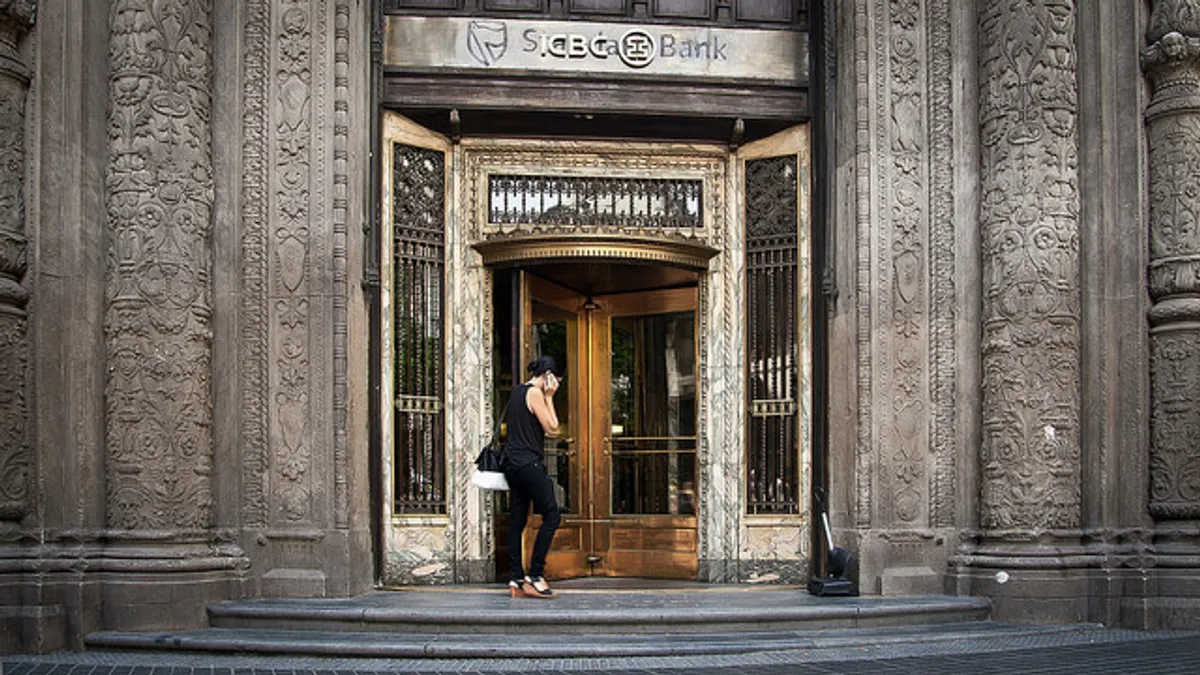Dive Brief:
- Disparities in small business lending have continued amid the COVID-19 pandemic with the implementation of the Paycheck Protection Program (PPP), according to The National Community Reinvestment Coalition (NCRC). A report released July 15 by the advocacy organization, which promotes equal access to financial services, found banks discouraged Black small business owners from applying for PPP loans.
- Using paired testing to detect discrimination, Black and white men and women participating in the study called banks in the Washington, D.C., area for information about obtaining a PPP loan. The experiment began April 27, the first day of the second round of PPP lending, through May 29, according to the report. In an analysis of baseline customer service level, Black study participants experienced 49 different instances of discrimination, researchers said. Almost half (43%) of the tests revealed that a white participant was favored over the Black participant in the pre-application arena, which is a violation of fair lending laws, according to the report. Black testers were treated differently in the following aspects: levels of encouragement, information provided, information requested and products offered.
- The NCRC recommended financial institutions implement a compliance program to enforce fair lending laws such as The Equal Credit Opportunity Act (ECOA). "This compliance program must include matched-pair testing as testing exposes weaknesses that need to be corrected through training," the report stated. Employee training should provide a clear understanding of "protocol, expectations and laws," NCRC said.
Dive Insight:
The PPP loan program, a component of the Coronavirus Aid, Relief, and Economic Security (CARES) Act signed into law March 27, was created to primarily assist small business owners with employee salaries and other expenses. The Small Business Administration (SBA), in coordination with the Treasury Department, oversees the program. But U.S. banks distribute the loans, which has caused some controversy.
The intentions of the program are good, but there’s a flaw in the PPP distribution structure, Mehrsa Baradaran, a law professor specializing in banking law at the University of California, Irvine, told Banking Dive, a HR Dive sister publication. "We rely on banks, and banks can choose their customers," Baradaran said. In regard to banks providing the loans on a first-come, first-served basis, they "didn't have a legal obligation to do it, and that's the problem," she said.
Although some major banks have provided large national companies loans, many, including Shack Shack, have returned or canceled more than $30 billion in PPP funds, CNBC reported; smaller community banks appear to have found more success in assisting small businesses in obtaining PPP funds.
The ECOA prohibits credit discrimination on the basis of race, color, religion, national origin, sex, marital status, age or because a person may receive public assistance. In the beginning phase of the PPP, the SBA did not collect borrower demographic information, according to NCRC. So there wasn’t much information available on who received loans, the organization said in the report.
President Donald Trump signed a bill into law July 4 extending the PPP loan application until Aug. 8. A report released by SBA July 6 disclosed information on the 4.9 million PPP loans that have been made, but the majority of applicants opted out of supplying data on race and ethnicity.
"Approximately 75% of all PPP loans did not include any demographic information because that information was not provided by the borrowers," SBA said in a document accompanying the report. "SBA is working to collect more demographic information from borrowers to better understand which small businesses are benefiting from PPP loans. The loan forgiveness application expressly requests demographic information for borrowers."
Speakers at a House Financial Services Subcommittee on Diversity and Inclusion hearing July 9 called for equal access to PPP funding for minority- and women-owned business enterprises. Lawmakers cited a June report by the National Bureau of Economic Research, which found that from February to April, 41% of Black-owned businesses ceased operations.
Black business owners received a small percentage of PPP loans provided to waste and recycling companies, according to a report by Waste Dive, HR Dive’s sister publication. The data obtained where applicants disclosed gender, race, ethnicity and military status showed that white male small business owners, who are not veterans, were most commonly the recipients of offered PPP loans of more than $150,000. Almost 3,000 recycling and waste applicants received loans under $150,000. "Companies listed as Black-owned collectively received 12 loans under $150,000," Waste Dive reported.












